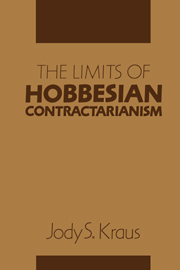4 - Kavka's hybrid contractarianism
Published online by Cambridge University Press: 05 June 2012
Summary
All political contractarian theories bear the burden of explaining the normative significance of hypothetical results because all of them rest their justification of political authority on an analysis of interaction in some hypothetical scenario. The chief attraction of Hobbesian contractarianism, I have argued, is that its hypothetical scenario purports to be normatively minimalistic, and so promises to beg no fundamental normative questions at the outset. The central problem with Hobbesian contractarianism, however, is that the most plausible arguments for the normative significance of hypothetical results appear to rest on idealistic premises, like those provided by Rawls's normatively rich original position, rather than the realistic premises provided by Hobbes's normatively minimalistic state of nature. Thus, the fundamental challenge for a Hobbesian theory is to provide an argument for the normative significance of its hypothetical analysis which “fits” the definition and analysis of its hypothetical scenario and thereby provides an account of the normative significance of hypothetical results in the normatively barren state of nature.
It is worth pausing to appreciate the difficulty confronting normative justifications based on hypothetical actions. The most common objection to such justifications usually takes the form of a libertarian objection to hypothetical consent as a justificatory strategy. Libertarian justification, in general, proceeds from a foundational commitment to the value of individual autonomy. Because actual, voluntary consent constitutes a manifest expression of an individual's autonomy, it suffices to justify the limiting of an individual's liberty on a libertarian theory.
- Type
- Chapter
- Information
- The Limits of Hobbesian Contractarianism , pp. 184 - 253Publisher: Cambridge University PressPrint publication year: 1993



